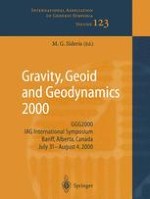2002 | OriginalPaper | Chapter
Earth Physics and Global Glacial Isostasy: From Paleo-Geodesy to Space-Geodesy
Author : W. R. Peltier
Published in: Gravity, Geoid and Geodynamics 2000
Publisher: Springer Berlin Heidelberg
Included in: Professional Book Archive
Activate our intelligent search to find suitable subject content or patents.
Select sections of text to find matching patents with Artificial Intelligence. powered by
Select sections of text to find additional relevant content using AI-assisted search. powered by
The global phenomenon of glacial isostatic adjustment is one that involves internal Earth System interactions that are recorded in ways that are essentially “geodetic”. This phenomenon, in which changes in the shape of the viscoelastic earth are driven by large scale exchanges of mass between the cryosphere and the oceans, is observable both “paleo-geodetically” and space-geodetically. Examples of paleo-geodetic measurements include 14C dated histories of the changing level of the sea (the geoid) with respect to the surface of the solid earth, as well as measurements of the history of variations in the rate of axial rotation based upon the timing of ancient eclipses of the sun and moon. Examples of space geodetic measurements include joint VLBI, SLR and GPS observations of displacement rate vectors of “points” fixed to the surface of the solid earth, as well as satellite derived measures of the “anomalous” gravitational field. Observations of the time dependence of the gravity field that will be delivered by the GRACE mission are expected to further transform our ability to infer both earth structural properties (e.g. viscosity) and past and present degrees of cryospheric (in)stability. This brief paper reviews the present state of the theory that has been developed in order to exploit the totality of such geodetic observations so as to enable accurate geophysical inferences to be made based upon them.
